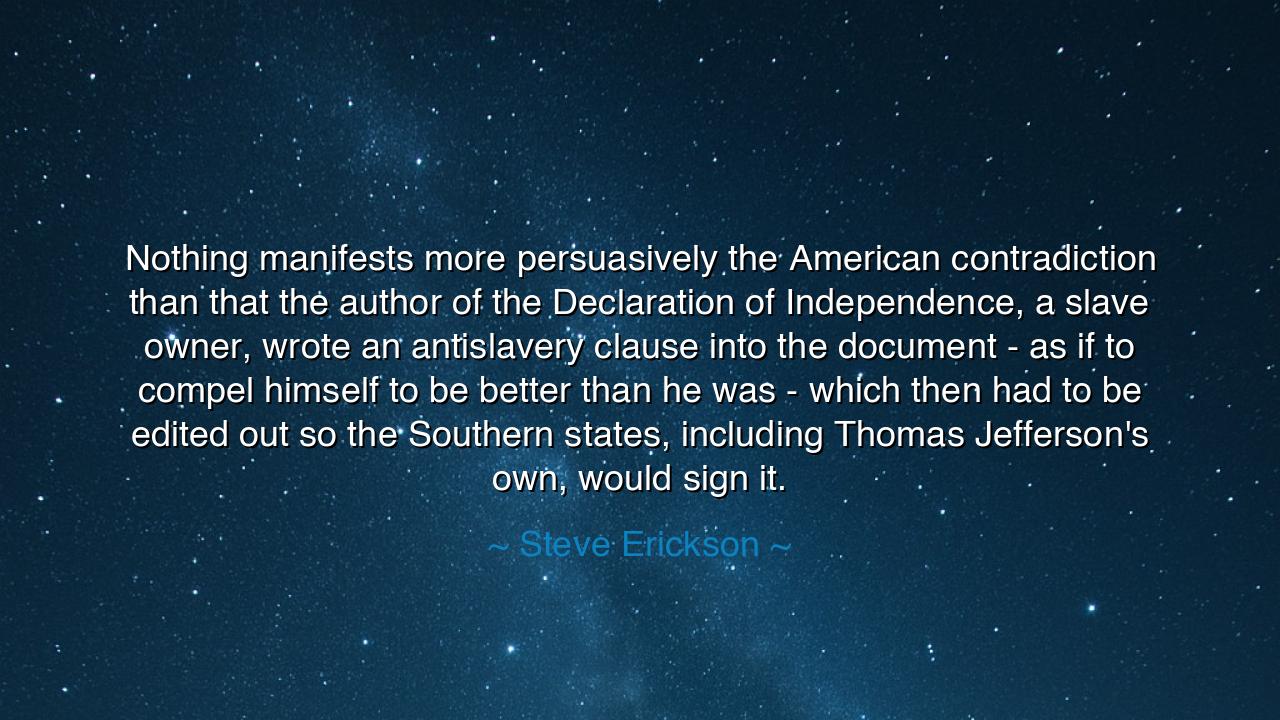
Nothing manifests more persuasively the American contradiction
Nothing manifests more persuasively the American contradiction than that the author of the Declaration of Independence, a slave owner, wrote an antislavery clause into the document - as if to compel himself to be better than he was - which then had to be edited out so the Southern states, including Thomas Jefferson's own, would sign it.






“Nothing manifests more persuasively the American contradiction than that the author of the Declaration of Independence, a slave owner, wrote an antislavery clause into the document — as if to compel himself to be better than he was — which then had to be edited out so the Southern states, including Thomas Jefferson’s own, would sign it.” Thus spoke Steve Erickson, bearing witness to one of the deepest ironies in human history — the paradox of a man who proclaimed liberty while holding others in bondage, and of a nation born proclaiming equality even as it denied that equality to millions. His words cut through the myths of patriotism not to destroy them, but to purify them — to remind us that truth, even when painful, is the only ground upon which true freedom can stand.
The story begins in the summer of 1776, when Thomas Jefferson, a man of immense intellect and moral complexity, took quill to parchment and gave birth to the words that would echo across centuries: “We hold these truths to be self-evident, that all men are created equal.” Yet in that same moment, Jefferson himself owned more than one hundred enslaved men and women — human beings whose sweat built his home, whose hands raised his crops, and whose freedom he denied even as he praised liberty as the natural right of all mankind. Here lies the American contradiction that Erickson so hauntingly reveals: the collision between ideal and action, between the light that men see and the shadows they refuse to banish.
Few remember that in the first draft of the Declaration of Independence, Jefferson included a passage condemning the slave trade as “an execrable commerce,” a crime against human nature itself. He wrote those words with righteous fury, perhaps to redeem himself in the eyes of posterity — perhaps to silence the whisper of his own conscience. But the fire he kindled was too dangerous for his time. The Southern colonies, whose wealth depended on slavery, objected fiercely. To preserve unity among the thirteen states, the clause was edited out, struck from history’s first page of freedom before the ink was dry. And so America was born — not whole, but divided at its very heart.
In this single act, we see not only the hypocrisy of men, but the tragedy of nations. Jefferson, like the country he helped to found, knew what was right yet failed to live by it. His mind reached for the heavens while his hands remained in the dust. It is a lesson as old as humanity itself: that the soul’s ascent is always hindered by its own weight. Yet in this tension — in this painful striving toward what he could not yet achieve — there is also a strange kind of nobility. For even in his failure, Jefferson left behind a blueprint for redemption. His words outlived his weakness, and generations yet unborn would use them to destroy the very system he sustained.
Indeed, nearly a century later, Abraham Lincoln would seize upon those same words — “all men are created equal” — as the divine promise that slavery must die. What Jefferson could not embody, others would carry forward. Thus, the contradiction Erickson describes is not merely a wound; it is also a challenge. It compels each generation to finish the work the last began. The antislavery clause, though erased from the document, was never erased from history’s conscience. It lingered like an unspoken vow, demanding fulfillment through struggle, war, and sacrifice.
Yet even today, the shadow of that contradiction endures. The legacy of inequality, born in compromise, still whispers in the walls of the Republic. Erickson’s words remind us that nations, like men, are not judged by their perfection but by their willingness to confront their flaws. To deny the darkness is to give it power; to face it is to begin the work of healing. The American contradiction is not merely a tale of hypocrisy — it is the story of a people wrestling with their own soul, forever caught between what they are and what they claim to be.
So let this teaching endure: that freedom is not a declaration but a journey. Every generation must write its own antislavery clause, its own act of courage against injustice. Do not wait for others to compel you to be better; compel yourself, as Jefferson tried but failed to do. Let your ideals not be hollow words, but living deeds. For hypocrisy dies only when truth is lived — and the truest patriotism is not blind pride, but the relentless pursuit of the promises once made in ink and still waiting to be fulfilled in flesh and spirit.
And remember, as the ancients would say: it is not the absence of contradiction that defines greatness, but the willingness to transcend it. America’s strength — and humanity’s — lies not in its perfection, but in its unending struggle to become better than it was.






AAdministratorAdministrator
Welcome, honored guests. Please leave a comment, we will respond soon